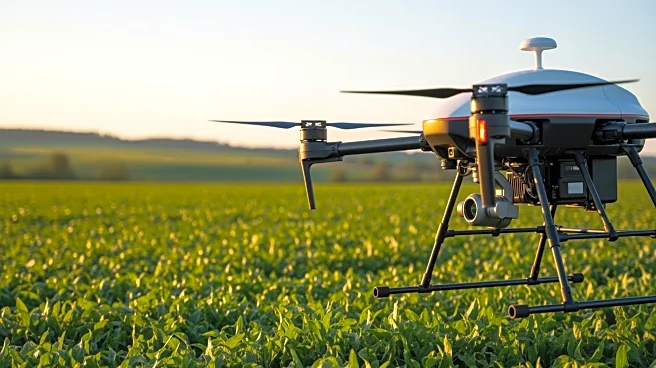What's Happening?
As the agricultural industry faces economic challenges, farmers are being encouraged to evaluate their current technology and consider upgrades that could enhance efficiency and return on investment. Bryce Baker from Precision Planting suggests that farmers invest in autonomous
functions for tasks like grain cart duties and tillage, with future developments expected in autonomous corn and soybean planting. Farmers are advised to conduct equipment audits with dealers to identify potential improvements. The Elsings, a farming family in Wisconsin, exemplify a balanced approach to technology adoption, maintaining older equipment while integrating new technologies like Precision Planting and Climate FieldView for data management.
Why It's Important?
The integration of autonomous technology in agriculture is crucial for addressing labor shortages and increasing operational efficiency. As the industry evolves, farmers who adopt new technologies can stay competitive and improve productivity. The shift towards automation reflects broader trends in agriculture, where precision and data-driven decisions are becoming essential. This transition could lead to significant changes in farming practices, impacting crop yields and resource management. The ability to operate with fewer workers could also mitigate the impact of labor shortages, a common challenge in the agricultural sector.
What's Next?
Farmers are likely to continue exploring and investing in autonomous technologies as they become more accessible and reliable. The development of autonomous planting systems for corn and soybeans is anticipated in the coming years, which could revolutionize planting practices. As technology advances, farmers will need to remain open to adopting new tools and systems to maintain competitiveness. Collaboration with technology providers and ongoing education will be key to successful integration. The industry may see increased partnerships between tech companies and agricultural operations to facilitate this transition.
Beyond the Headlines
The adoption of autonomous technology in agriculture raises ethical and cultural questions about the future of farming. As technology becomes more prevalent, traditional farming practices may evolve, impacting rural communities and the identity of farming. There are also considerations regarding data privacy and the reliance on technology providers. Long-term, this shift could influence the economic landscape of agriculture, with potential implications for employment and rural economies.
















